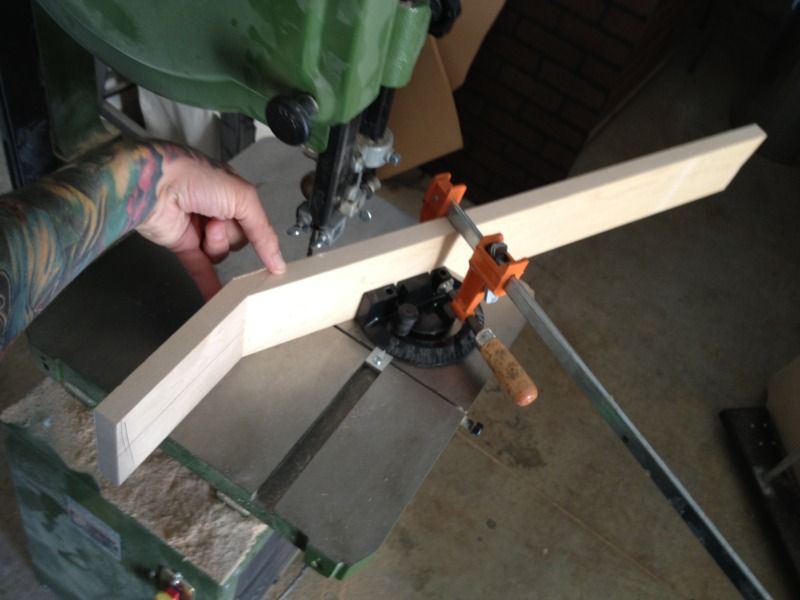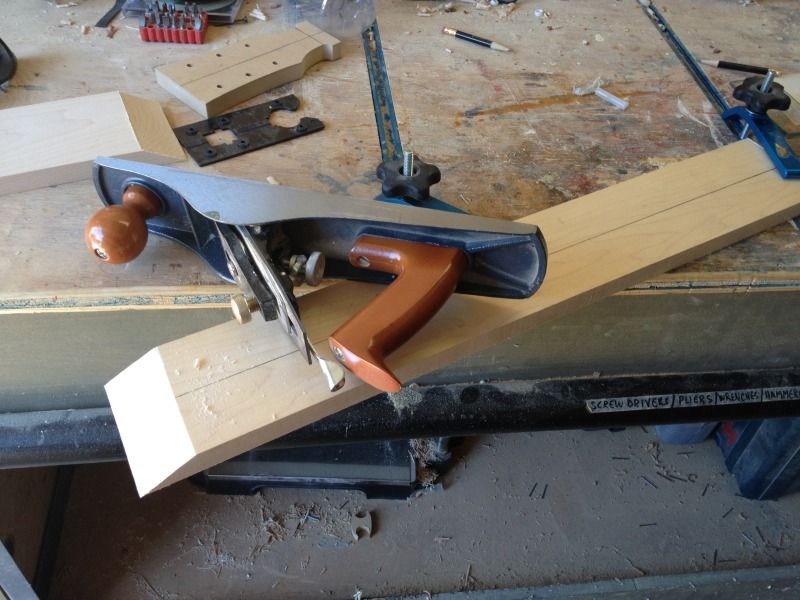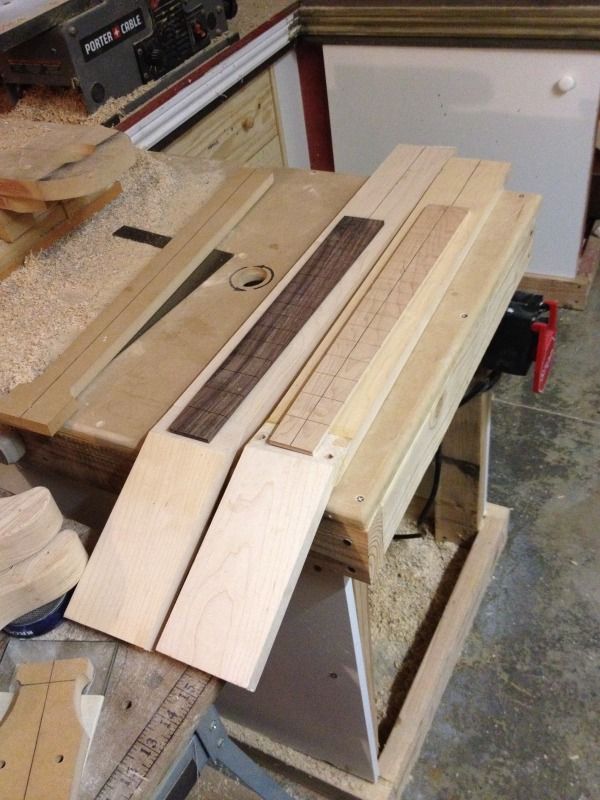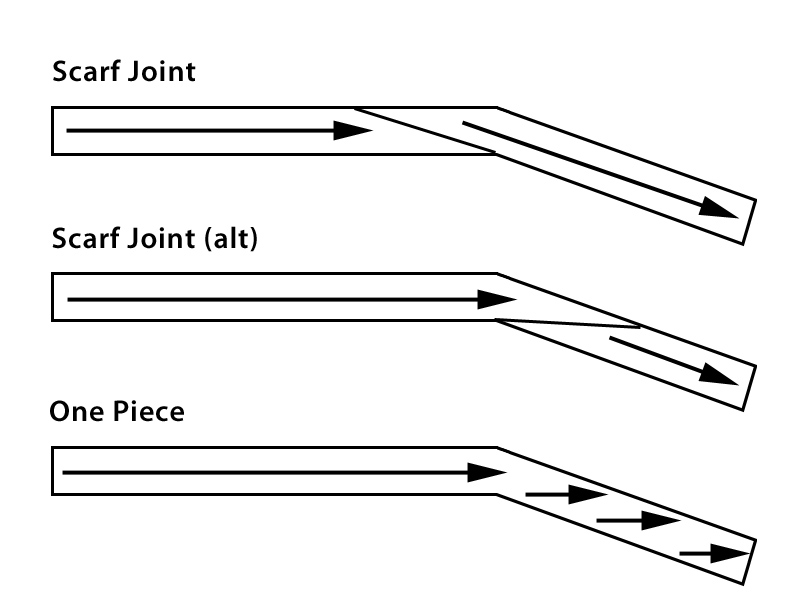Yeah, I didn't want to get a new fret slotting template, but also I wanted these to be unusual, and not a straight copy. By using these scale lengths I can slot 20 fretboards at once then figure out what to do with them later.storyboardist wrote:These look great, Andrew. Love the idea of a 24" scale LP. Any reason you're not messing with 24.75" scale length tho? Don't want to have to mess with making a new fretting jig?andrewdoeshair wrote:The necks will be made differently from each other, one short scale and one regular scale. Shown here with neck templates filling in for real necks...

25.5" and 24" swamp ash LPJRDCs
- andrewdoeshair
- PAT. # 2.972.923

- Posts: 6808
- Joined: Fri Oct 16, 2009 10:16 pm
- Contact:
Re: Swamp ash LPJRDC
If you wish to make an apple pie from scratch, you must first invent the universe. - Carl Sagan
- HNB
- PAT. # 2.972.923

- Posts: 13908
- Joined: Tue May 10, 2011 7:55 am
- Location: Puyallup, Washington
- Contact:
Re: 25.5" and 24" swamp ash LPJRDCs
Very cool. I know you are doing set necks, but if you decide to do any that would work with a Fender neck, let me know.  I would dig one like you have with a tele front plate instead of rear routing.
I would dig one like you have with a tele front plate instead of rear routing.  Something different.
Something different. 
Christopher
Lilith Guitars
Lilith Guitars
- toez10
- PAT. # 2.972.923

- Posts: 246
- Joined: Sun Aug 26, 2012 5:57 am
Re: 25.5" and 24" swamp ash LPJRDCs
Beautiful woodworking you're doing. I think they look great!
- andrewdoeshair
- PAT. # 2.972.923

- Posts: 6808
- Joined: Fri Oct 16, 2009 10:16 pm
- Contact:
Re: 25.5" and 24" swamp ash LPJRDCs
So I buys some cheap maple. Got enough for two necks, about $20... I saw, on another thread, that a builder used a jig to cut the 14º angle for the scarf joint. I didn't want to make a jig. Not at first anyways. I used my mitre gauge dealie, set as shallow as I could get it (which was still pretty damn steep, still, actually).
Made a cut.

Checked it out

Cleaned it up.

Had a HELL of a hard time trying to glue it, gave up, decided that next week I'll make my own mitre jig dealie to get a better headstock angle, and use dowels or something to align the pieces whilst glueing (as I tried to do briefly here, before giving up- note the holes in the sides of the one blank).

Made a cut.

Checked it out

Cleaned it up.

Had a HELL of a hard time trying to glue it, gave up, decided that next week I'll make my own mitre jig dealie to get a better headstock angle, and use dowels or something to align the pieces whilst glueing (as I tried to do briefly here, before giving up- note the holes in the sides of the one blank).

If you wish to make an apple pie from scratch, you must first invent the universe. - Carl Sagan
- Stereordinary
- Expat

- Posts: 10672
- Joined: Fri Sep 15, 2006 11:55 am
- Location: Vancouver, WA USA
Re: 25.5" and 24" swamp ash LPJRDCs
I want to point something out here, that I will try to present as constructively as possible. I am biased towards a certain method, and I don't mean to be overly critical of those who do it the other way, but each method is just as easy to do, so I never understand why it's so commonly done what I consider to be the "wrong" way.

With the first method of scarf joint that you see in the photo here (the much more common method), you end up with the first fret to somewhere around the third fret on one piece of wood, and the rest of the neck on another piece of wood. It's documented in every book I've read on the subject that doing it this way can create buzzing and vibrations on the first few frets that do not exist on the rest of the neck. In other words, even if there's no buzzing, those frets sound different from the rest. If only because of the resonant frequencies of the wood used, but still.
In the second method of scarf joint pictured here, the joint, and therefore the spliced piece of wood is completely isolated in the headstock. It's effect on the guitar's tone is microscopic.
There's another way that I've done an angled headstock that was created using 4/4 stock. Basically I made a paddle-head style Fender neck, then just glued a piece of wood to the back of the paddle, making it at least twice as thick as it was before, and giving me enough thickness to cut an angle out of it. Piece of cake and no awkward glue-ups. Doesn't fix the grain orientation problem, but honestly the main reason grain orientation on one-piece necks is such a problem is because most angled-headstock guitars are modeled after Gibsons and have something like a 14˚ angle. In my opinion, that is far too much angle and is totally unnecessary. You can go as low as 4.5˚ angle on a headstock and the strings will still have enough down pressure on the nut to resonate properly and not slip out of the slots (assuming the nut is done correctly). Headstock angle is a whole other subject really, but I just want people to have as much info as they can before doing this stuff.

With the first method of scarf joint that you see in the photo here (the much more common method), you end up with the first fret to somewhere around the third fret on one piece of wood, and the rest of the neck on another piece of wood. It's documented in every book I've read on the subject that doing it this way can create buzzing and vibrations on the first few frets that do not exist on the rest of the neck. In other words, even if there's no buzzing, those frets sound different from the rest. If only because of the resonant frequencies of the wood used, but still.
In the second method of scarf joint pictured here, the joint, and therefore the spliced piece of wood is completely isolated in the headstock. It's effect on the guitar's tone is microscopic.
There's another way that I've done an angled headstock that was created using 4/4 stock. Basically I made a paddle-head style Fender neck, then just glued a piece of wood to the back of the paddle, making it at least twice as thick as it was before, and giving me enough thickness to cut an angle out of it. Piece of cake and no awkward glue-ups. Doesn't fix the grain orientation problem, but honestly the main reason grain orientation on one-piece necks is such a problem is because most angled-headstock guitars are modeled after Gibsons and have something like a 14˚ angle. In my opinion, that is far too much angle and is totally unnecessary. You can go as low as 4.5˚ angle on a headstock and the strings will still have enough down pressure on the nut to resonate properly and not slip out of the slots (assuming the nut is done correctly). Headstock angle is a whole other subject really, but I just want people to have as much info as they can before doing this stuff.
Rhoney Guitars, 2010-2017, 2025?
- chnlone
- PAT. # 2.972.923

- Posts: 1363
- Joined: Sun Jan 24, 2010 2:53 pm
- Location: Kansas City, MO
Re: 25.5" and 24" swamp ash LPJRDCs
It seems to me(and I would have no idea, just an assumption I suppose) that having a shallower angle to the headstock would have the added benefit of lowered forward pull from the strings and less likely to end up like this:


- Stereordinary
- Expat

- Posts: 10672
- Joined: Fri Sep 15, 2006 11:55 am
- Location: Vancouver, WA USA
Re: 25.5" and 24" swamp ash LPJRDCs
Yeah, headstock breaks are exactly why scarf joints exist. On Gibsons, you have a one-piece neck with a 14-17˚ angle, and that big gouge of wood taken out for the truss rod access cavity. Basically they end up with very little wood right in that area, so there's just no strength there. The guitar falls on it's headstock at a gig (heavy ass tuners won't help this either) and snappy snappy.
Rhoney Guitars, 2010-2017, 2025?
- pp1d00d00
- PAT. # 2.972.923

- Posts: 59
- Joined: Fri Jan 07, 2011 10:41 am
Re: 25.5" and 24" swamp ash LPJRDCs
tv yellow and double cut are an "ur" combo. i am disappointed to learn that this build is no cake walk, as cake walking is all that i am capable of...
- Stereordinary
- Expat

- Posts: 10672
- Joined: Fri Sep 15, 2006 11:55 am
- Location: Vancouver, WA USA
Re: 25.5" and 24" swamp ash LPJRDCs
Personally I think building set necks with angled headstocks is just as easy as building bolt-on neck guitars. Which isn't to actually say either one is easy, just that they are of an equal difficulty. It's all down to a matter of engineering and just getting to know (read: getting used to) each process.
Rhoney Guitars, 2010-2017, 2025?
- andrewdoeshair
- PAT. # 2.972.923

- Posts: 6808
- Joined: Fri Oct 16, 2009 10:16 pm
- Contact:
Re: 25.5" and 24" swamp ash LPJRDCs
Was going to give the necks another shot today, but instead I deep cleaned my workspace... It needed it, bad...

The reason I was going to do the scarf joints with the headstock above the neck, was that I figured the headstock would then be adhered to both the back of the neck, and to the fretboard, giving it more support. I didn't think it would really cause any problems... But I still haven't glued anything, yet. Anything can happen.
I'll be getting this in the next few weeks, and it might make this build go a little differently (maybe it'll be way sweeter to flush trim the neck with a pin router, as opposed to a bearing-guided bit? We'll see. I've wanted this for a long time now, and this deal jumped up and bit me)


The reason I was going to do the scarf joints with the headstock above the neck, was that I figured the headstock would then be adhered to both the back of the neck, and to the fretboard, giving it more support. I didn't think it would really cause any problems... But I still haven't glued anything, yet. Anything can happen.
I'll be getting this in the next few weeks, and it might make this build go a little differently (maybe it'll be way sweeter to flush trim the neck with a pin router, as opposed to a bearing-guided bit? We'll see. I've wanted this for a long time now, and this deal jumped up and bit me)

Last edited by andrewdoeshair on Sun Oct 07, 2012 8:31 am, edited 1 time in total.
If you wish to make an apple pie from scratch, you must first invent the universe. - Carl Sagan
- DoneOne
- PAT PEND

- Posts: 12
- Joined: Mon Apr 27, 2009 2:31 pm
Re: 25.5" and 24" swamp ash LPJRDCs
right or wrong, it's probably because the headstock being glued bottom and top (under fingerboard) would appear to make it more secure.Stereordinary wrote:...so I never understand why it's so commonly done what I consider to be the "wrong" way.
I wonder if a laminated finger type of joint would cause any of the problems you described around the first couple of frets.
- valley_parade
- PAT. # 2.972.923

- Posts: 4408
- Joined: Fri Oct 31, 2008 7:09 am
- Location: The 315
- Contact:
Re: 25.5" and 24" swamp ash LPJRDCs
I got allandrewdoeshair wrote:Was going to give the necks another shot today, but instead I deep cleaned my workspace... It needed it, bad...

- andrewdoeshair
- PAT. # 2.972.923

- Posts: 6808
- Joined: Fri Oct 16, 2009 10:16 pm
- Contact:
Re: 25.5" and 24" swamp ash LPJRDCs
Gave the scarf joint another try... I made a quick sled/jig thingie to cut a more shallow angle than my band saw's mitre thingie was able to. I don't know what the angle is, I just eyeballed it. It would take me 4 minutes to alter the jig to any angle later, this is just what I did for now, to learn...

I clamped the headstock piece over the neck piece and planed them both together. I still want to go buy a super nice plane, as this tool tends to get more use than my jointer, and almost as much use as my router... I love the feeling of a job well done with hand tools. Like a total MAN. Especially when I'm dripping with sweat afterward.

And here is a dry run to see if I could clamp the thing okay. It seemed alright. I didn't get a pic of it with the glue. I still need to glue on a piece to make the heel thicker (aiming for about 1")


I clamped the headstock piece over the neck piece and planed them both together. I still want to go buy a super nice plane, as this tool tends to get more use than my jointer, and almost as much use as my router... I love the feeling of a job well done with hand tools. Like a total MAN. Especially when I'm dripping with sweat afterward.

And here is a dry run to see if I could clamp the thing okay. It seemed alright. I didn't get a pic of it with the glue. I still need to glue on a piece to make the heel thicker (aiming for about 1")

If you wish to make an apple pie from scratch, you must first invent the universe. - Carl Sagan
- andrewdoeshair
- PAT. # 2.972.923

- Posts: 6808
- Joined: Fri Oct 16, 2009 10:16 pm
- Contact:
Re: 25.5" and 24" swamp ash LPJRDCs
The headstock wasn't totally flat, because the joint shifted as it was drying, so there was a step. I removed material from the headstock piece, using a jack plane, so that it was flat and straight, flush with the neck half of the joint. I'll say again, this is my favorite tool.

Used my curved channel jig and a 1/4" spiral bit on my router. Worked like a charm, except that I cut the channel too long... Oh well, the extra cut will still hide under the fretboard...

Trimmed and adjusted a rod I had previously made for a baritone neck, so that it would fit my short scale neck, here... I sort of put the second guitar on hold, because a lot of this is so foreign and new to me, I want to see if it works, before I try doing multiples at once... Before this, I've only used pre-made rods that require a straight channel.

Drilled and chiseled to fit the anchor.

This guy was supposed to help me drill the truss access area, but I forgot that my hand drill isn't at my workshop right now, because I took it home for another project (Ps, look at all the gross glue and gunk on the handles of my clamps... Sick, man...)

This is where I am so far... This just might work! That template there is for the filler strip thingie that goes over the truss rod. I also need to glue on a piece of maple to make the heel thicker, but I might do that after the neck is flush trimmed... Not too sure...


Used my curved channel jig and a 1/4" spiral bit on my router. Worked like a charm, except that I cut the channel too long... Oh well, the extra cut will still hide under the fretboard...

Trimmed and adjusted a rod I had previously made for a baritone neck, so that it would fit my short scale neck, here... I sort of put the second guitar on hold, because a lot of this is so foreign and new to me, I want to see if it works, before I try doing multiples at once... Before this, I've only used pre-made rods that require a straight channel.

Drilled and chiseled to fit the anchor.

This guy was supposed to help me drill the truss access area, but I forgot that my hand drill isn't at my workshop right now, because I took it home for another project (Ps, look at all the gross glue and gunk on the handles of my clamps... Sick, man...)

This is where I am so far... This just might work! That template there is for the filler strip thingie that goes over the truss rod. I also need to glue on a piece of maple to make the heel thicker, but I might do that after the neck is flush trimmed... Not too sure...

If you wish to make an apple pie from scratch, you must first invent the universe. - Carl Sagan
- HNB
- PAT. # 2.972.923

- Posts: 13908
- Joined: Tue May 10, 2011 7:55 am
- Location: Puyallup, Washington
- Contact:
Re: 25.5" and 24" swamp ash LPJRDCs
Looks like fun experiments. My roomy is moving out this coming Summer and my garage will open up more. I am hoping to get working on those old original (strange) body designs. 
Christopher
Lilith Guitars
Lilith Guitars
